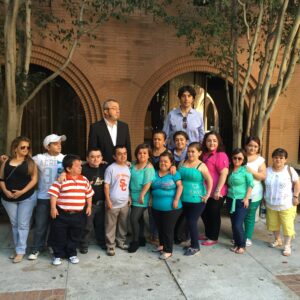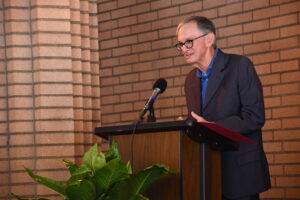 After a long battle with Parkinson’s disease, USC Leonard Davis School of Gerontology professor emeritus David A. Peterson died on Thursday, October 4, 2012.
After a long battle with Parkinson’s disease, USC Leonard Davis School of Gerontology professor emeritus David A. Peterson died on Thursday, October 4, 2012.
Peterson was an expert on lifelong learning who served as director of the USC Leonard Davis School from 1978 to 2003. He was appointed the first holder of the Edward and Rita Polusky Chair in Education and Aging in 1999 and, in 2007, saw the Association for Gerontology in Higher Education create an award in his name.
“He was an early leader in the field of gerontology,” said James Birren, founding dean of the USC Leonard Davis School and widely considered the father of gerontology. “His background was in education, but he soon embraced more aspects of human life and aging.”
Peterson also served as associate dean of the USC Leonard Davis School from 1985 to 2003. He was responsible for the school’s instructional programs, including the development of the bachelor of science, master of science and the PhD degrees in gerontology as well as dual-degree programs with 10 other USC schools and departments.
“Our son was with me when David died. It has been a long difficult passage for David and for those who love him, but now he is at rest,” said his wife Ellen Peterson in email. “I do thank you for your appreciation of David as your colleague and friend. Thank you for your support of me as well.”
A date has not yet been set for the memorial service, but according to faculty, staff and students of the USC Leonard Davis School, Peterson and his accomplishments will never be forgotten.
“I speak for everyone associated with the USC Leonard Davis School when I say what an amazing mind and spirit David A. Peterson had, and what an enormous impact he had on the field,” said dean Pinchas Cohen, MD “It is with great sadness that we say goodbye, but we are proud to honor his exceptional life and legacy.”
UPDATE: Memorial Service: Saturday, October 27, 11:00 A.M., First United Methodist Church Chapel, 500 E. Colorado Blvd., Pasadena, 91101. There will be a reception following.
Memorials can be given in the form of contributions to the USC Leonard Davis School of Gerontology: David A. Peterson Scholarship OR David A. Peterson Fellowship. (USC Leonard Davis School of Gerontology, 3715 McClintock Ave., Los Angeles, CA 90089)

 “United we stand, divided we fall” isn’t just a patriotic slogan – it’s also the rallying cry of Californians who joined forces with USC’s Fall Prevention Center of Excellence to celebrate the fifth annual Fall Prevention Awareness Week.
“United we stand, divided we fall” isn’t just a patriotic slogan – it’s also the rallying cry of Californians who joined forces with USC’s Fall Prevention Center of Excellence to celebrate the fifth annual Fall Prevention Awareness Week.





